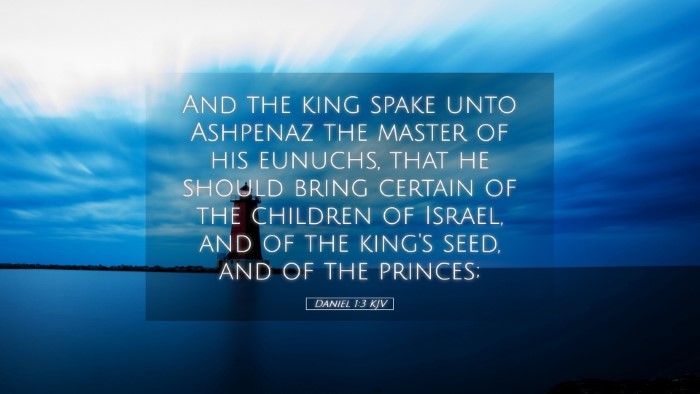Old Testament
Genesis Exodus Leviticus Numbers Deuteronomy Joshua Judges Ruth 1 Samuel 2 Samuel 1 Kings 2 Kings 1 Chronicles 2 Chronicles Ezra Nehemiah Esther Job Psalms Proverbs Ecclesiastes Song of Solomon Isaiah Jeremiah Lamentations Ezekiel Daniel Hosea Joel Amos Obadiah Jonah Micah Nahum Habakkuk Zephaniah Haggai Zechariah MalachiDaniel 1:3
Daniel 1:3 KJV
And the king spake unto Ashpenaz the master of his eunuchs, that he should bring certain of the children of Israel, and of the king's seed, and of the princes;
Daniel 1:3 Bible Commentary
Commentary on Daniel 1:3
Verse: "Then the king instructed Ashpenaz, the master of his eunuchs, to bring some of the children of Israel and some of the king's descendants and some of the nobles," (Daniel 1:3, NKJV).
Introduction
Daniel 1:3 marks a significant moment in the narrative of the Book of Daniel, highlighting the Babylonian initiative to integrate the youth of Israel into their empire. This verse illustrates the beginning of a process whereby the elite of Jerusalem were exiled and re-educated to serve in a foreign court, a theme that resonates deeply in discussions on identity, faithfulness, and cultural assimilation.
Historical Context
This passage occurs against the backdrop of the Babylonian conquest of Judah, which was a profound moment in Israel’s history. It serves to underline the sovereignty of God even in the midst of national tragedy. Public domain commentators like Albert Barnes emphasize the severity of the situation, as the exile represented not just a loss of homeland but also a challenge to the covenantal identity of the people of God. The selection of youths signifies an attempt to propagate Babylonian culture and suppress Hebrew identity.
Key Themes
- Cultural Assimilation: The directive given by King Nebuchadnezzar to Ashpenaz reveals the intent of Babylon to assimilate the Jewish people. Matthew Henry remarks that this method of statecraft was common in ancient empires, where the ruling power would try to reshape the cultural identity of conquered peoples.
- Divine Sovereignty: The text implies that God’s hand was at work even in Nebuchadnezzar's decree. As Adam Clarke points out, God used this situation for His larger purpose, as it ultimately served the preservation of a faithful remnant and the demonstration of God's power before kings.
- Youth and Potential: The selection of young men from noble backgrounds reflects both a strategic initiative by the Babylonians and a reminder of the potential of youth. As noted by Matthew Henry, God often uses young people to accomplish significant purposes, reiterating that their formative years are crucial for spiritual and personal development.
Character Analysis of Ashpenaz
Ashpenaz, the chief of the eunuchs, plays a pivotal role in this verse. Albert Barnes indicates that his character, while not deeply fleshed out in the text, demonstrates a level of authority and responsibility for the captives. He is tasked with the delicate balance of managing the captives, while also potentially being a precursor to the influence that young characters like Daniel would wield in Babylon.
Theological Implications
This verse provides insight into the theology of suffering and preparation. The capture and subsequent indoctrination of the Israelites signifies not just a loss, but also a preparatory stage for God's plan. As Adam Clarke points out, while the circumstances appear dire, they set the stage for divine revelation and the demonstration of God’s supremacy over Babylon's gods.
Application for Pastors and Theologians
For pastors and theologians, this passage encourages a reflection on the role of cultural engagement in ministry. As the Church interacts with contemporary culture, the narrative of Daniel becomes pertinent in how to navigate faithfulness in a secular society. Matthew Henry urges believers not to compromise their faith, using Daniel's experience as a model of maintaining integrity and conviction amidst pressure to conform.
Conclusion
In conclusion, Daniel 1:3 serves as a profound illustration of God’s providential control over history and individual lives, a testament to the enduring impact of faith even when exiled from familiar contexts. The implications of exile extend beyond mere historical note; they represent an ongoing challenge for believers to maintain their identity and faith within diverse cultural narratives. As Albert Barnes eloquently observes, understanding these dynamics is crucial for effective ministry and scholarship today.


